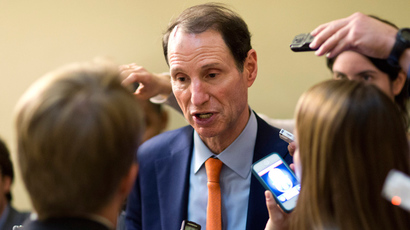NSA admits to spying on more people than previously thought

Testimony elicited during a Wednesday oversight hearing in Washington revealed that the United States intelligence community regularly collects email and telephone metadata from way more persons than previously thought.
Quizzed about the government’s investigative methods during a House of Representatives Judiciary Committee hearing early Wednesday, National Security Agency Deputy Director Chris Inglis said that the government obtains basic information pertaining to the communication records of potentially millions of more Americans than leaked NSA documents previously suggested.
After former NSA contractor Edward Snowden released classified files to the Guardian newspaper, journalists Glenn Greenwald and Spencer Ackerman cited one of those documents that said US investigators "analyzed networks with two degrees of separation (two hops) from the target" while conducting probes.
“In other words, the NSA studied the online records of people who communicated with people who communicated with targeted individuals,” the journalists wrote.
On Wednesday, however, Inglis enlarged the scope of that surveillance program by saying the NSA actually investigates persons that can come within three “hops” of an intelligence target.
NSA analysts can perform "a second or third hop query,” Inglis admitted during questioning.
Although powers vested in the US through the Foreign Intelligence Surveillance Act forbid it from specifically targeting Americans, lawmakers critical of the program have cautioned that the personal data of too many US citizens are regularly swept up as government officials attempt to connect-the-dots using telephone and Internet metadata. By investigating persons within a third degree of separation and not just two, authorities broaden their probes by putting records from potentially millions of more persons, American and otherwise, into their hands.
Weighing in after the revelation, the Guardian’s Ackerman authored a new piece exploring just how extensive these powers really are.
“A three-hop query means that the NSA can look at data not only from a suspected terrorist, but from everyone that suspect communicated with, and then from everyone those people communicated with, and then from everyone all of those people communicated with,” Ackerman wrote.
“Do the math,” tweeted Cato Institute research fellow and author Julian Sanchez. “Your whole contact list. All their contact lists. All THOSE people's contact lists. That's a LOOOT of people.”
Do the math: Your whole contact list. All their contact lists. All THOSE people's contact lists. That's a LOOOT of people. #FISAOvesight
— Julian Sanchez (@normative) July 17, 2013
Philip Bump of The Atlantic Wire noted in his report after the hearing that a University of Milan study in 201 found that everyone on Internet, on average, is only 4.74 steps away from anyone else. According to Inglis’ comment, the NSA can then consider anyone within three of those steps when conducting an investigation.
A Pew Internet study conducted that same year found that the average American has 634 ties in their overall Internet network, with more experienced Web surfers having that many more connections.
Alex Abdo, a staff attorney at the American Civil Liberties Union, told The Atlantic Wire that the "two-hop" standard "will inevitably sweep in Americans,” notwithstanding the government’s insistence that Americans aren’t targeted.














